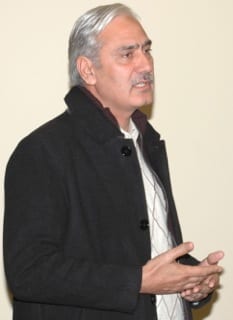Who is a member?
Our members are the local governments of Massachusetts and their elected and appointed leadership.
 Nearing the end of their six-week visit to the United States, 15 Pakistani officials today reflected on topics ranging from the efficacy of local government to the swift tallying of votes on election night during a farewell lunch at the MMA office.
Nearing the end of their six-week visit to the United States, 15 Pakistani officials today reflected on topics ranging from the efficacy of local government to the swift tallying of votes on election night during a farewell lunch at the MMA office.
Through an exchange program administered by the MMA, the Pakistanis were hosted by local officials in a dozen Massachusetts communities, where they observed the day-to-day operations in city and town halls as well as what it’s like to watch election returns in the U.S.
In Pakistan, several of the officials noted, government functions tend to be concentrated at the national level, making it more difficult to introduce reforms and innovations locally. Muhammad Farooq, a civil servant in the capital city of Islamabad, said he was impressed that relatively small communities like Norwood and Franklin, where he stayed, have full-time recreation and human resources directors.
“They are achieving wonderful things,” Farooq said. He described what he observed as “beautiful bureaucracy.”
Umana Afridi, who administers a U.S. Agency for International Development program in a section of Pakistan known as the Federally Administered Tribal Areas, expressed similar views.
“America has a very strong administrative system,” especially at the local level, said Afridi, who toured the State House with Rep. Paul McMurtry of Dedham. “This is such a transparent system. A common person can see [government] documents. This is not very much the case in Pakistan.”
Afridi, who stayed in Westwood and Boxford, lauded a series of local programs she observed, including special education and programs geared toward seniors.
“In Pakistan, many people insist that the United States does not care well for the elderly, but that is not the case,” she said.
Afridi and other Pakistanis noted that much of their nation’s spending goes to the military, and that an end to the war in Afghanistan, and the subduing of Islamic militants within Pakistan, could free up resources for other purposes.
Dr. Syed Yasir Hussain, a public health specialist in Balochistan province, expressed admiration for the government response to Superstorm Sandy in New Jersey and New York. He said that Pakistan lacks the resources to provide highly effective responses to natural disasters.
“When the war is over, we will turn our view to the development of our country,” said Hussain, who stayed in Chelsea and Westwood.
Sajjad Mubin, who was in Foxborough on election night, noted two contrasts between U.S. and Pakistani elections. One involved Republican nominee Mitt Romney’s concession speech, in which he congratulated President Barack Obama. In Pakistan, Mubin said, it is more typical for the losing candidate to complain about vote-rigging or other unfair practices.
Mubin, the director of planning and development in Punjab province, also praised the swiftness with which votes were counted and announced. A lack of electronic voting machines in Pakistan means that tallying votes takes much longer, often adding to suspicion that vote totals have been manipulated.
In addition to Boxford, Foxborough, Franklin, Norwood and Westwood, Pakistanis were hosted in Chelsea, Easton, Grafton, Hamilton, Salem, Somerville and Wenham.
“We thought it was supposed to be a learning experience for the Pakistanis, but we learned as much as we taught,” said Norwood Selectman Bill Plasko.
The exchange program is funded by the U.S. State Department’s Bureau of Educational and Cultural Affairs, which awarded a grant to the Institute for Training and Development in Amherst. Over the course of three years, ITD has been working with the MMA to provide training for 75 Pakistani public administrators on municipal government operations in the United States. The five visits by different groups of Pakistanis began in 2011.